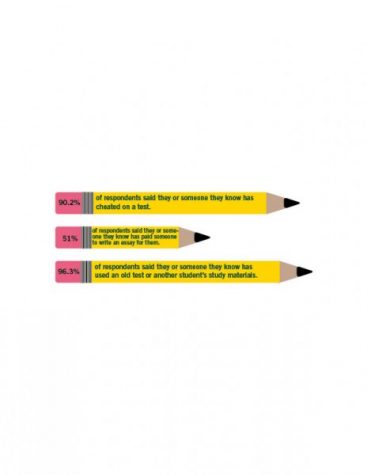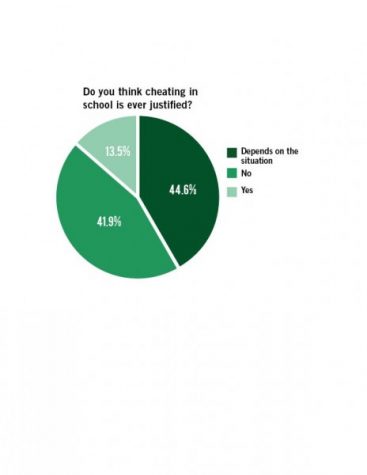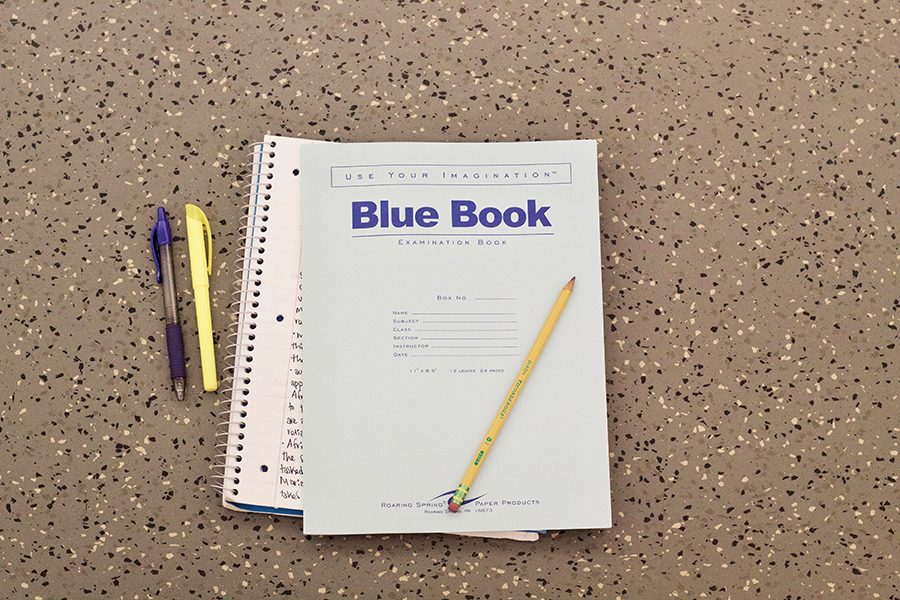Making the Grade: Students, professors acknowledge culture of cheating
Josh Jessiman | Photography Editor
In a poll with 260 responses, 90.2 percent of students admitted to cheating on a test at some point in their college careers.
The sweat begins to trickle. Panic sets in. The questions aren’t making any sense. Was this even on the study guide?
Out of 260 respondents to a Hullabaloo poll, 90.2 percent of people said they or someone they knew admitted to cheating on a test at some point in their college careers.
Many students expressed feeling frustration and anxiety to achieve the best grades possible. Between the pressures to succeed and juggle an academic, social and work life, students say they are sometimes tempted to cheat.
“Everything is so competitive when it comes to internships, jobs, honor roll, Latin honors, extracurriculars that take your GPA into account,” senior political economy major Jared Shurman said. “A lot of professors don’t always understand that when you walk into a class the first day and they say, ‘you’re not going to get an A in this class,’ how much that devastates people and really freaks people out because it is important.”

Over 250 Tulane students responded to a poll about their cheating opinions and habits.
Besides having to deal with what can sometimes be an overwhelming number of class assignments, students are often involved with extracurricular activities and must maintain responsibilities they have outside the classroom. One way some students say they are able to get through their busy days and still do well on class assignments and tests is by cheating in some form.
Of the faculty and students interviewed, most agreed that Tulane has a culture of cheating.
How Students Cheat
In addition to the students who take advantage of opportunities to turn in and receive credit for other students’ work, some students also help others cheat. While these students’ academic work may not be impacted by helping others cheat, the Tulane Code of Academic Conduct defines cheating as, “Giving, receiving, or using, or attempting to give, receive, or use unauthorized assistance, information, or study aids in academic work …”
More than 60 percent of respondents reported having written essays for other people, and 76.3 percent have provided answers to tests. Nearly half of the respondents had received some form of payment to help students cheat.
“I’ve been paid to write essays for other people,” Sloane*, a freshman in the School of Science and Engineering who prefers to remain anonymous said. “I know it’s bragging, but they got A’s with those essays, just saying. And they themselves are pretty [bad] writers, so it’s a little amazing no one noticed.”
According to some students who were asked about their experiences, there are different categories of cheating, with varying levels of moral ambiguity and consequences. For instance, one way students cheat is by using test material from previous semesters.
In fact, 96.3 percent of respondents reported using material from previous tests or another student’s study materials to get better grades. This form of cheating is often associated with Interfraternity and Panhellenic Council members due to test banks, which include essays, tests and study materials passed down by previous students.
“I see a lot in both sorority and fraternity life,” Panhellenic Council organization member Tiffany* said. “There are people that share old tests and old resources that get used, and I personally have taken material from people who have already taken the class.”
Other students said they believe the simple practice of using past test material to study for upcoming tests is, in itself, not cheating. Some professors have taken to posting previous tests on Canvas for students to practice, but sharing past test materials with other students is a violation of Tulane’s Code of Academic Conduct.
“If someone took a class a semester before, they could make a very comprehensive study guide and then share with other people, which is technically cheating but I personally don’t consider it as morally ambiguous as being actually in a test and looking up answers on your phone or having flash cards underneath your desk,” Valentina*, a sophomore who lives in Paterson Hall who prefers to remain anonymous, said.
Another common form of cheating involves students using material from class while actually taking the test. Though many students may cheat by taking notes with them into a test, some students say they do not consider this form of cheating quite as severe as cheating off of another person.
More than half of respondents reported having paid other students to write essays for them, while 36.7 percent have admitted to directly plagiarizing material.
Each incoming freshman is mailed Tulane’s Code of Academic Conduct. The variety of ways in which students can potentially commit misconduct and receive disciplinary sanctions are outlined and bolded.
“Our honor code violations tend to be cheating, plagiarism, multiple submissions of the same paper and providing false information,” Molly Travis, an associate dean of Newcomb-Tulane College who sits on the Honor Board, said. “And we’ve had a number of unauthorized collaboration cases from the business school, with students working together on an assignment when they were explicitly told not to work together.”
Why Students Cheat
Two common arguments were made for why students cheat. Some said that when students become stressed or frustrated over the amount of material covered throughout a semester’s worth of classes, their anxiety can lead students to forgo their integrity in favor of making the desired high grade in a class.
Many teachers are sympathetic to the academic stresses students face. According to English Writing Professor Elizabeth Kalos-Kaplan, teachers are aware of the incentive to cheat in an attempt to make some of the workload more bearable. Most teachers, however, still view cheating as unethical.
“I think more broadly a small but significant subset of undergraduate students … view the academic experience as something that they bought and paid for, and therefore the integrity of the process is less important than the outcome,” Mark Vail, associate professor of political science, said.
Another factor students and teachers think leads to cheating is laziness.
“I think people are really lazy,” Tiffany*, a junior in the School of Liberal Arts who prefers to remain anonymous, said. “I think if they have the option of cheating, it just seems like such an easier chance, and I think a lot of people feel like they put so much work into school that cheating once or cheating twice is not going to make an overall difference — it’ll just take a little stress off their lives.”
Teachers expressed frustration at this laziness. Vail said cheating is an example of laziness at its worst, being both a betrayal of the academic contract and a popular misconception because doing the work from the beginning is usually easier than cheating.
Others said they think cheating can be a byproduct of recent technological advancements and conveniences. Travis noted as a problem the rampant use of cell phones during exams, which was addressed by adding to the honor code a prohibition against unauthorized cell phones.
“Internet access is also an issue, copying/pasting is so easy that the boundaries between what they write and what was written by someone else is blurred,” Francoise Grossmann, clinical assistant professor of public health, said. “On the teaching side, some formats of online courses and exams may be invitations for cheating.”
How Cheating Affects Students
“The real problem really comes, from my perspective, with a degrading of the experience for those who don’t [cheat],” Vail said. “The fact that it creates a sort of second moral economy of academic achievement whereby those who mail it in, who don’t try hard, who want to take easy shortcuts to academic success are rewarded while those who don’t … are faced with more difficult tasks.”
Asked whether cheating is ever justified, 13.5 percent of students answered, ‘Yes,’ 44.6 percent said it depended on the situation and 41.9 percent answered, ‘Never.’

Over 250 Tulane students responded to a poll about their cheating opinions and habits.
“I don’t care what kind of extenuating circumstance you come up with,” Sloane* said. “There is no way to justify artificial inflation of your academic abilities. It’s quite selfish — we are not pursuing educations for the sake of the mental exercise. The point is to become valuable and productive members of society in the field of our choosing.”
Other students say they choose not to cheat to avoid the consequences they know they would face. Some of these students, though, said they would jump at the chance to get the right answers while doing little to no work.
“Cheating makes me nervous just because I do think they take it really seriously, and I have heard of people getting in trouble, and I’m not willing to risk that.” Tiffany* said. “But if someone can give me answers beforehand or, for example, for an online course that I took last semester, someone emailed me all the answers to every quiz for the class, and I never had to do any work for it.”
Many professors have stated there is no justification for cheating. Professor Kalos-Kaplan pointed out that cheating in no way allows students to gain an edge over the competition. Rather, it will only make students less prepared after they graduate.
“I see this type of plagiarism as indicative of the culture that permeates many universities today,” Kalos-Kaplan said. “… When the purpose of college is simply to get a degree, the cheating becomes simply a shortcut to achieving it. Students don’t see the greater significance of what they’re learning in college as being useful outside the classroom setting. It’s that mindset that I find so disheartening, especially when it comes to writing.”
Moving Past Cheating
Tulane is not the only school to face the problem of cheating among its students. A 2014 Huffington Post article reported that 75 percent of all college students have admitted to cheating at least once.
“I think it’s partly a function of the culture here, but I think it’s also … partly generational and partly a function of problems and limitations in American higher education more broadly,” Vail said.
Michael Morton, Undergraduate Student Government vice president for academic affairs, works to facilitate conversations about the academic culture on campus and the changes that need to prevent cheating.
One program USG has worked on is the Classroom Video Pilot Project, which enables students to preview certain courses. With the help of the Academic Learning Center, USG has made “Crash course” videos and supplemental lessons available to students. There have been discussions about having mid-semester evaluations for students as well.
“All of these will hopefully allow students to feel more prepared and less likely to cheat,” Morton said. “If there are any concerns or ideas, I encourage students to reach out to me at [email protected] so that we can work together to create a sustainable solution.”
Solely viewing the academic experience as a requirement for a future job can foster a climate of cheating. That being said, Travis said she believes Tulane students are capable of promoting an environment of academic integrity.
“So the exciting thing to me is when you all as students help to maintain … a culture of academic integrity, you have the power to help create more of a culture of honesty,” Travis said. “Faculty can do only so much. The success of an honor code depends on you all.”
*These pseudonyms have been selected by the Hullabaloo to protect the privacy of students who prefer to remain anonymous for the reporting of this article.
Your donation will support the student journalists of Tulane University. Your contribution will allow us to purchase equipment and cover our annual website hosting costs.

















Leave a Comment